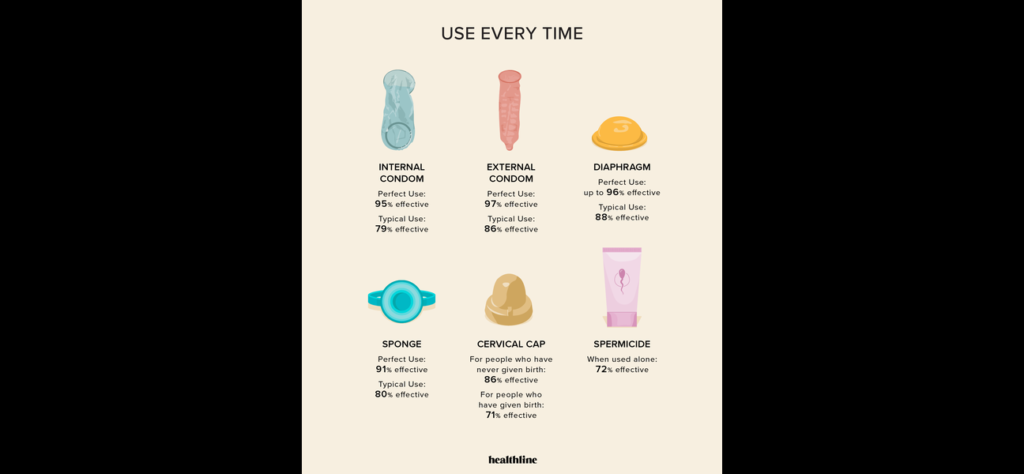Birth control remains a critical component of modern reproductive health. It represents different methods to prevent unintended pregnancies.
Among the most common methods are:
- condoms
- birth control pills
- injectable contraceptives (like Depo-Provera)
Each method has its merits and limitations. These are influenced by how consistently and correctly they are used.
Condoms
Condoms are widely accessible and perform the dual purpose of preventing pregnancy and reducing the risk of sexually transmitted infections (STIs).
However, they may not work as well if they are not used correctly, if the material is damaged, or if oil-based lubricants are used, as these can break down latex.
When used correctly, condoms are about 98% effective. But that doesn’t take into account human errors in using them.
Birth Control Pills
People like birth control pills because they work and give users control over their reproductive plans. These pills contain hormones that stop ovulation.
To keep their high level of effectiveness (over 99% with perfect use), they must be taken every day around the same time. It can make them much less effective if you do not do this or if specific medications interact with them (more on that later).
Depo-Provera Shots
Depo-Provera is an injectable birth control that works very well, about the same as the birth control pill.
It works almost 100% of the time, but you have to stick to a strict schedule and get an injection every 12 weeks.
Despite its convenience, it’s not suitable for everyone.
Some side effects possible are:
- weight changes
- mood swings
- other hormonal impacts
It might also not be a good idea for people who have certain health problems, like breast cancer or serious liver disease.

Impact of Medications on Birth Control
Some medications can influence and hinder how hormonal birth control works. Antibiotics like Rifampin and antifungal drugs such as Griseofulvin are known disruptors.
The efficacy can also be lowered by some HIV treatments and seizure medicines.
Before starting birth control, it is important to talk to your doctor about any medicines or supplements you are taking.
Historical Perspectives on Contraception
The methods used in the past were very different, ranging from herbal mixtures to physical barriers.
Many of them were not as safe or practical as the methods used today. These methods from the past show how far we have come in making birth control safe and reliable.
Choosing the Right Birth Control Method
Your health, lifestyle, and reproductive goals should all be taken into account when choosing the best method of birth control.
Easy-of-use, cost, possible side effects, and your own health history are all considered when choosing a specific plan for you.
A healthcare professional can give advice after carefully looking at these factors, making sure that the method chosen fits the person’s needs.
Consultation and Regular Review
Because of the subtleties and possible interactions that come with birth control methods, it is important to talk to your doctor regularly.
Any worries about side effects, possible drug interactions, or changes in the person’s health should be talked about during these meetings. Reviewing the method on a regular basis can help make sure that it stays useful.
Final Points
Birth control methods work best when they are used correctly and invariably.
Helping people make smart decisions about their reproductive health includes knowing the specific needs and possible interactions of each choice.
Choosing the best birth control option for you can be complex. Consultation with healthcare professionals can help manage this choice to find the most suitable method for their needs.
Research continues and new methods are created, it is still important for people who use birth control to stay up to date on their options and the best ways to use them.
For more information, visit Canada Drugs